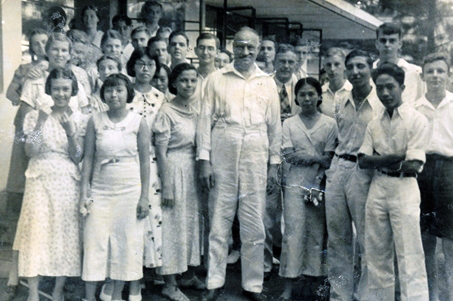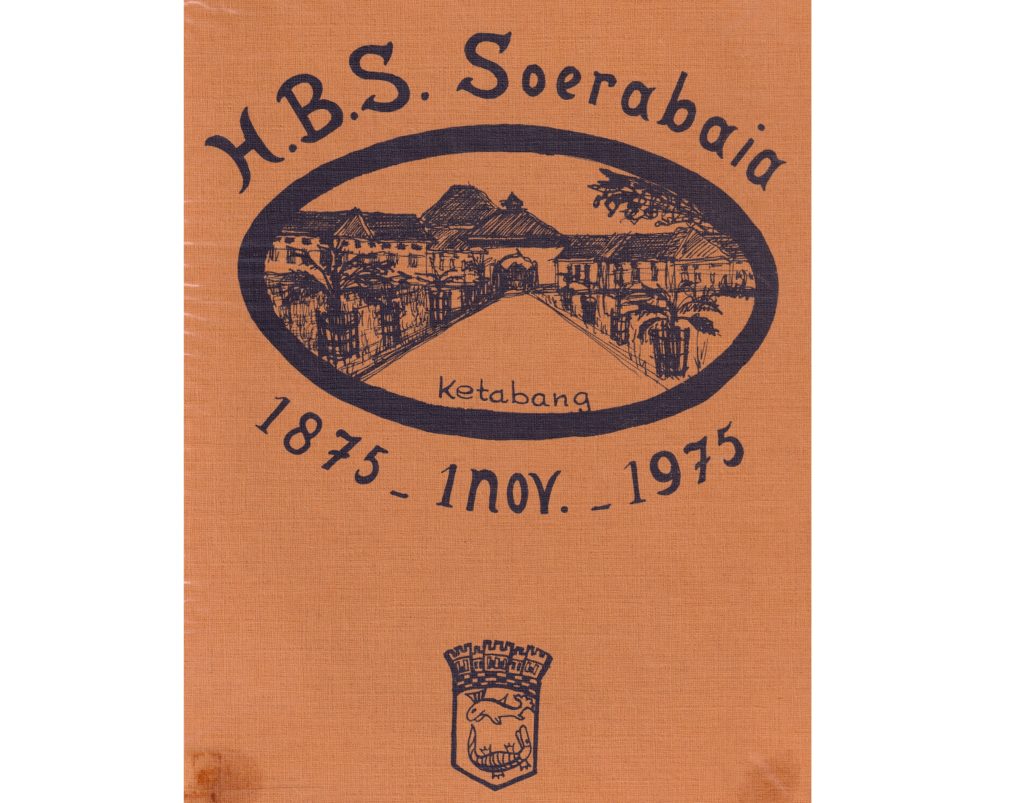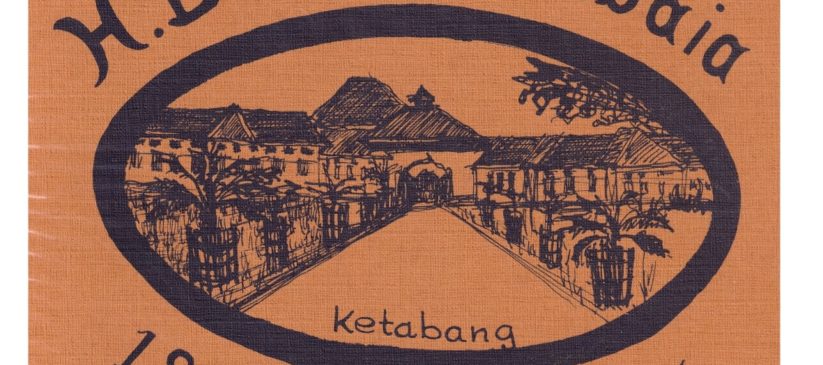Author: Mariska Snijdewind
59 – “Fragments from a Distant Past …”
Part of the cover of the anniversary album HBS 1875-1975. See below for full cover
From the anniversary book of the HBS in Surabaya*, Ing Lwan Taga-Tan highlights one contribution which contains more than mere anecdotal information.
On November 1, 1975, the HBS (hogere burgerschool, secondary school) in Surabaya – which since 1958 continued as an Indonesian secondary school – celebrated its centennial. Former pupils residing in the Netherlands organized a centennial party. Old pupils and teachers reacted enthusiastically to calls to contribute towards the anniversary book. ‘A HBS period around 1900’ was the title of the oldest contribution by Annie Muller, a pupil of the school between 1898 and 1903. A worthy concluding piece was that of H. Radstake, the school’s last Dutch director, aptly titled ‘The Last Months’. Between these two writings spanned 200 pages of catchy, hilarious, and – above all – nostalgic memories of a pleasant HBS youth in colonial and post-colonial Surabaya.
Famous names are among the alumni: former pupil Sukarno is commemorated in ‘The First President of Indonesia’. E. Breton de Nijs (Rob Nieuwenhuys), who studied there between 1922 and 1927, contributed ‘How I Fell into Writing’. Historical overviews and piles of photographs made the book into a unique historical document.
From this wealth of memories, this one deserves special attention, as it goes beyond anecdotes. In ‘Fragments from a Distant Past …’, Han Swan Tiem, HBS pupil from 1932 to 1937, describes not only her experiences as one of the few ‘colored’ students at the HBS, but also takes the peranakan Chinese community to task.
You can find out more about Han Swan Tiem in the next ‘Foto met Verhaal’ story, but let’s first read her testimony:

Fragments from Afar, of What Had Been …
“When I think back to my HBS time (until 1937), I can compare that time to a long, nicely-paved street, without obstacles one could stumble upon, or potholes one’s foot can get stuck in. I cannot recall any obvious barriers or scary bridges that would prevent me from going to the next grade. As long as you walk properly, resolutely, deliberately, and with perseverance – just like a terrier! Don’t look to your left or to your right, just look straight ahead, because you need to reach that finish line. That is what your parents silently expect from you, with or without desperation, because such things should always be kept to yourself. Never show what goes on inside of you …
So, the other students (at the HBS, 98.5% of the student body are of pure – or almost pure – Dutch heritage ) and the teachers must have incidentally thought to themselves: “What goes on in the heads of those Chinese kids?” Well, a lot, actually, but we did not translate that into series of thrillers, because we simply did not have time to do that. Studying, studying … everything was difficult and strange, but with firm pioneers’ courage – something like a death wish – we strived to succeed. And the other unsuspecting students and teachers thought: “So easily – those Chinese kids, they get those good grades with such ease.” However, those Chinese kids knew why they had to reach that finish line: to go on and reach that next, tougher finish line, in order to be on equal footing with the other 98.5% with lighter pigmentation. In fact, it was a privilege to be among those 1.5% (+darker pigmentation) that were allowed to attend the HBS, because for that you had to have attended the First European Elementary School ELS. In fact, it was with the grace of God that those pigmented kids were allowed to enroll in the ELS (various requests in advanced, certificates of good, proper behavior, and a father that was not just merely a small grocer or something like that).
So, you had to make the most out of what you got. Those elitists could then go on to join the upper crust: at least to become a civil servant – well, to be a clerk or notetaker. And that seemed to be a preferable choice than to be a small shop owner, or noodle stallholder in the Chinese camp.
Han Swan Tiem
Contributed by Ing Lwan Taga-Tan

*Source: HBS-Soerabaia Anniversary Album 1875-1958, p.107-p.111. With gratitude to Tiong Han Go, who lend out the book to CIHC.
Translated by Lina Sidarto



